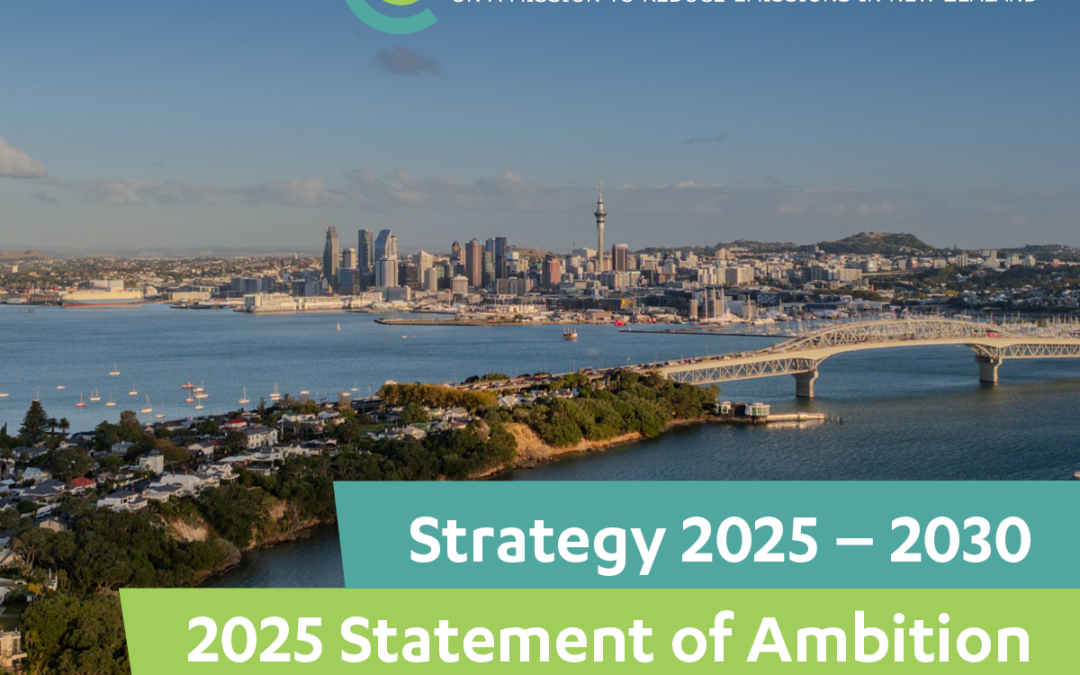News
Latest from the Coalition

Climate Leadership Insights: The B Team Australasia
Lynette Mayne, Executive Chair of The B Team Australasia, recently visited Aotearoa New Zealand for the launch of the Climate Leaders Coalition’s new Statement of Ambition and refreshed strategy. In this Q&A, Lynette shares insights into the work of The B Team...

Climate Leaders Coalition launches next chapter
The Climate Leaders Coalition (CLC) is this morning unveiling a new Statement of Ambition and refreshed Strategy, marking the next step in business-led climate action in New Zealand – just as COP30 concludes in Belém.

SBC Hot Seat with Shannil Varma (CLC Manager)
This week, we've got Shannil Varma, Manager of the Climate Leaders Coalition (CLC), in the hot seat. Shannil's role sits within the Climate and Nature team at SBC (which is the secretariat organisation for CLC), and he oversees all the day-to-day operations and...

Climate Leaders Coalition re-commits to ambitious climate action with new convenor
The Climate Leaders Coalition welcomes Genesis CEO Malcolm Johns as the Coalition’s new convenor, succeeding Spark CEO Jolie Hodson MNZM. Since 2018, the CEO-led Coalition, made up of 87 signatories and accounting for around 30 percent of New Zealand’s GDP, has helped...
Search all news

SKYCITY reveals first low carbon menu at the Sugar Club
SKYCITY’s The Sugar Club is combining fine dining and climate change action with New Zealand’s first ever low carbon menu developed with Enviro-Mark Solutions.Expertly created by Executive Chef, Josh Barlow, in partnership with Enviro-Mark Solutions and WWF-New Zealand, the three-course menu has been measured and assessed as low carbon using only locally sourced ingredients. The low carbon menu will be revealed tonight at an exclusive event, in celebration of World Environment Day.

Fonterra – celebrated brothers turn their brains to dairy problems
Small fleets of robots cleaning up cow poop, fertiliser travelling at the speed of a jet plane, a computer-simulated rumen. Two eminent New Zealand scientists – who happen to be brothers – are applying their brains to finding high-tech solutions to farming pollution.

Cost of cutting the footprint in dairy
Onfarm greenhouse gas emissions represent the greatest proportion of dairy’s environmental footprint, Fonterra sustainable value manager Lara Phillips says. From a glass of milk, 90% of the emissions come from onfarm, 9% is from manufacturing and 1% of the footprint is from international distribution. While New Zealand dairy farmers have one of the lowest environmental footprints in the world, they can’t rest on their laurels, she says.

Two months to go – one day event to galvanise business action on climate change
The Sustainable Business Council together with the Climate Leaders Coalition, EECA, Ministry for the Environment, and WWF New Zealand invite you to a one-day event to empower business action on climate change.
EMBARK is being held at SKYCITY Auckland on July 24 and is designed to help businesses learn practical ways to reduce their emissions.

OCS NZ and Au releases Sustainability Report 2018
Every business – large or small – has the opportunity to make a positive difference when it comes to sustainability, says OCS ANZ Managing Director, Gareth Marriott.
Mr Marriott made the comments with the release of the company’s first integrated sustainability review, covering both of its Australian and New Zealand operations.

What five NZ companies are doing to clean up with EV power
Nearly a year ago, key New Zealand businesses formed the Climate Leaders Coalition – a group committed to measuring and reporting its greenhouse gas emissions and working towards keeping global warming within two degrees, as specified in the Paris Agreement.
So far, 89 Kiwi CEOs have signed the Climate Change Statement. The companies collectively represent half of NZ’s gross emissions, 25 per cent of private sector Gross Domestic Product and Employ over 130,000 people.
Transport emissions are a key target for the Coalition, representing 18 per cent of NZ’s emissions. Here are five ways member companies are greening their fleets.

EVtalk checks out ‘AT Local’
An EV rideshare trial is about half way through its year’s “test and learn” on Auckland’s North Shore.
So EVtalk’s Sophia Wang tried Auckland Transport’s AT Local service in the lower Devonport peninsula which aims to reduce congestion for those travelling to and from the area’s three ferry terminals.

The story of a revolution: How public transport transformed Auckland
Public transport in Auckland looks set to hit an all-time of 100 million passengers this year. Patrick Reynolds looks back at how we got here and what next to expect for the future of transport.

Waste Management sets NZ sector benchmark for carbon reduction
Marking a first for the waste industry in New Zealand, Waste Management NZ has achieved independent certification for managing and reducing Greenhouse Gas Emissions, Waste Management Managing Director, Tom Nickels, said today.
The company has worked over two years to complete CEMARS® (Certified Emissions Measurement and Reduction Scheme) certification, measuring all greenhouse gas emissions and joining 53 companies from other sectors in New Zealand who have taken this step.

Meridian – NZ’s car ‘mindset’ needs change
E-scooter system may provide a path to getting more electric vehicles on our roads.
Within 10 years many Kiwis could be car-sharing in much the same way they do now with electric scooters and bikes.
Nick Robilliard, property and procurement manager of Meridian Energy says he sees a shift coming in vehicle ownership, a model he believes will change significantly in the next 10 years.

Pukekohe’s Wastewater Treatment Plant receives solar energy boost
Franklin residents are one step closer to an eco-friendly flush with the addition of a new solar array at the Pukekohe Wastewater Treatment Plant.

3R – Zero Carbon Bill welcome news for Hawke’s Bay
The release of the Zero Carbon Bill is welcome news, particularly in Hawke’s Bay where the effects of coastal erosion and weather events due to climate change are already being felt, says Hawke’s Bay sustainability expert and Chief Executive of 3R Group, Adele Rose.
